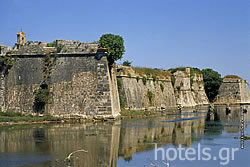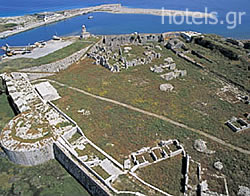 History of Lefkada
History of Lefkada
The name of the island "Lefkada" routed from the name "Lefkas Petra" or "Lefkas Akra", an ancient name of today's Leukata, the southern cape of the island.
Humanity in Lefkada can be traced back to the Paleolithic era. The distinguished German archaeologist Wilhelm Dairepfeld, associate of Henry Schliemann in the Troy excavations, conducted extensive archaeological research in Nydri, and brought important findings from the copper age (2,000 B.C.) to light and hence started the theory that Lefkada can be identified with Homers Ithaca.
The ancient city of Nirikos, 7th century b.c., which was discovered in Kalligoni at Koulmos, was the island's first capital. It was surrounded by a great wall, of which only a small part is left.
The history of Lefkada, from the 7th century b.c. after becoming a Corinthian colony up until the Roman conquer, is politically connected to the city of Corinthos, which Lefkada followed in all important events of the time: the Salamina naval battle, the battle of Platees, the Peloponnesian war as an ally to the Spartans and the expedition of Alexander the Great.
 Strongly resisting to the Romans during the 3rd century B.C., Lefkada finally submits to the conqueror in the 2nd century. During the Roman occupation considerable projects were constructed, the stone bridge, to name one, which connected the island of Lefkada with Akarnania, and had a length of 700 meters. They also reconstructed the ancient wall.
Strongly resisting to the Romans during the 3rd century B.C., Lefkada finally submits to the conqueror in the 2nd century. During the Roman occupation considerable projects were constructed, the stone bridge, to name one, which connected the island of Lefkada with Akarnania, and had a length of 700 meters. They also reconstructed the ancient wall.
In 1204 the island was incorporated to the dominion of Hepiros, but from the year 1294 Lefakada came into the hands of the French, since it was given as an offering to John, Count of Orsini, who later built the nucleus of the Aghia Mavra Castle, still erect today at the island's entrance.
The history of the island, since the 14th century and until it's incorporation with the Greek state, is full of events - milestones of long historical adventure.
The History from the 12th Century until Today
1204: The island was incorporated into the Despotate of Epirus.
1294: Despot Nicephorus I married his daughter Maria to Giovanni Orsini, giving her Lefkada
as a dowry.
1331-1362: The island was captured by the Angevins.
1357: Villagers on Lefkada rose up against Gratianus Zorze.
1362-1479: The family passed into the hands of the Tocci family.
1479: The island was captured by the Ottoman Turks.
1502-1503: Lefkada was temporarily under Venetian rule.
1503-1684: Recaptured and ruled by the Turks.
1684-1797: The island returned to Venetian rule with a short break (1715 - 1716) when the Turks recaptured it. The island capital was moved from Kastro to the Amaxiki plain, the location of the current day capital.
1797: The island was conquered by the French Republicans.
1798-1807: Russian - Turkish domination. In 1802 it joined the Ionian State, the first, small,
semi - independent Greek state under Russian and Turkish "protection".
1807-1810: Lefkada was conquered by the Imperial Army of France.
1810: It passed to the English who integrated it into the Ionian Island State.
1819: The villagers of Lefkada revolted and people from the island participated in the 1821 Revolution.
1864: Integrated into Greece proper along with the other Ionian Islands.
|


